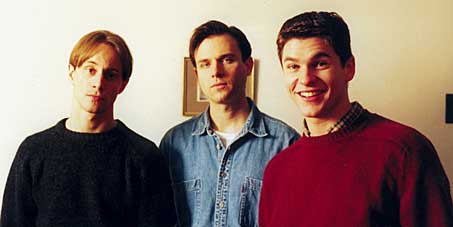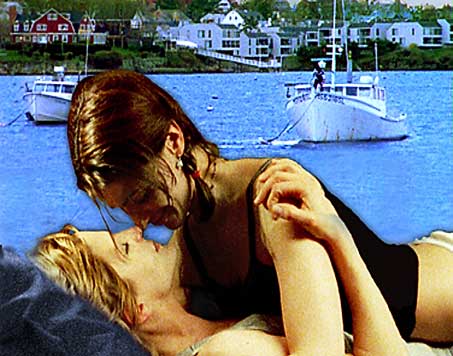
 |
||||||
|
GAY
FILM REVIEWS BY MICHAEL D. KLEMM
|
||||||
|
Metrosexuality TLA Releasing, 2001 Director/Screenplay: Starring: Rikki Beadle-Blair, Noel Clarke, Paul Keating, Karl Collins, Pui Fan Lee, Silas Carson, Rebecca Varney, Francis Lima Unrated, 140 minutes
24 Nights TLA Releasing, 1999 Director/Screenplay: Starring:
Unrated, 97 minutes
Treading Water Wolfe Video, 2001 Director: Screenplay: Starring: Unrated, 95 minutes. |
My
Two Dads
Thank God for England's Channel 4. Over the years, its innovative programming has included My Beautiful Launderette and the original Queer as Folk. Once again, daring to be different - and boldly going where no American network would ever dream of going - Channel 4 has given the world Metrosexuality. This celebration of diversity is a cornucopia of couplings: man and man, woman and woman, man and woman, gay and straight, black and white, young and old. Just the sort of entertainment youÕd find on The 700 Club. Metrosexuality, written and directed by Rikki Beadle-Blair, was a six part series that aired in 2001. Against the backdrop of London's bohemian Notting Hill, nearly two dozen characters look for love and a sense of family. At its center is Kwame, a 17 year old boy of mixed African and English descent who lives with Max, his black gay father (played by Beadle-Blair). Max has split up with Jordan, his longtime partner, and Kwame will stop at nothing to see his two dads reunited. But Jordan, who is also black, is dating a white, testosterone-fueled ex-marine named Jonno, while Max has placed a 1-800 phone-sex ad. Undaunted, Kwame erases Max's phone messages and plots to discredit Jonno. Meanwhile, he is also madly in love with Asha, a beautiful young woman who he courts disastrously. |
|
That so many different races and sexual orientations exist side by side is Metrosexuality's biggest charm and its greatest asset. Writer/director/star Beadle-Blair's aim was to depict the richness of a poly-racial and poly-sexual society, and show what bigots miss when they are exclude those who are different. Instead of hitting the audience over the head with a plea for tolerance, the characters simply exist and interact naturally with each other. Not since Relax... It's Just Sex have I seen an ensemble comedy-drama that was so inclusive in its racial make-up. |
|
|
Stereotypes are skewered. A pile of gay men and lesbians play a game of football on rollerskates. A straight hairdresser runs Max's beauty salon. A punkish queer leatherman wears a bright pink mohawk and matching goatee. When homophobes insult the patrons of a gay bar, a drag queen begins to growl like a lion and springs to attack. Kwame complains that Max isn't a masculine role model ("If I wanted my head ripped off by a bitchy queen, I would have stayed home with my dad!") and then reacts even worse to father Jordan's overly-macho boyfriend. Like the first Queer as Folk, Metrosexuality pushes the envelope even for British television. While not as explicit as QAF, we are treated to such sights as Kwame and Dean masturbating under the covers in the same bed, and the sexually inexperienced Jaye with a dental dam stuck to her face. On a more pastoral note, there is a touching love scene between Cindy and Doris - their child at a babysitter and the house to themselves - which ends with them landing on a squeaky toy and then losing the mood because they miss their kid. |
|
|
The entire cast is a blast. Each is unique in their look, making it impossible to confuse them. Of special note is Max, who functions as a sort of matriarch to the entire clan. Picture a male Whoopie Goldberg who is muscular, has blonde dreadlocks and wears halter tops and spandex. Max is both a mother hen and the queen bitch from hell, and no viewer will ever forget him. The catchword here is "fun." Metrosexuality is very entertaining, over-the-top, and refreshingly different. The DVD set includes a director and cast commentary, with documentaries and interviews. Most notable is the show's pilot Heterosexuality which, oddly enough, almost acts as a prequel to the mini-series which eventually aired. |
|
 |
|
|
As it is the holiday season, I received two new releases which happen to be Christmas movies. In 24 Nights, written and directed by Kieran Turner, a young gay man stills believe in Santa Claus and writes him to ask for a boyfriend. Kevin Isola stars as Jonathan, a young slacker who works in a New York gay bookstore. He lives with his sister, Marie, (The Sopranos' Aida Turturro), and her husband. He thinks that Santa has granted his wish when a cute young man named Toby applies for a job at the bookstore. Jonathan's friends tell him that he is being delusional. Especially when Toby, who has just moved to NY from a small Southern town, (with his childhood sweetheart Keith in tow), becomes a party boy who stays out all night at clubs. I was hoping to like this film but couldnÕt get past the silliness of its central premise. Perhaps if it was a flat-out farce (like La Cage Aux Folles) it might have worked. Instead, cartoonish scenes alternate with intimate drama and the mix just doesn't gel. Jonathan is a weak leading man and it's hard to feel much sympathy for him. The best performance, predictably, comes from Turturro. That's not to say that movie isn't without its charms. A game of "45 Poker" in which the characters try to lose all of their old bad 45 rpm records is rather funny (the rules of the game are included on the DVD) especially when one of the players keeps betting with "Ring My Bell." Another highlight was Marie's drunk mother-in-law plopping herself down next to Toby, rubbing his leg and asking "Have you ever seen The Graduate?"
|
|
 |
|
|
The lesbians do it better in Lauren Himmel's Treading Water, even though this may be one of the most depressing Christmas movie ever made. Angie Redman is Casey, a longshorewoman who lives on a boat with her social worker girlfriend, Alex. Casey's very rich New England family lives across the bay as a constant reminder of the upbringing that she rejected. Casey's mother refuses to accept that her daughter is gay and is doubly embarrassed that she fishes for a living. But Casey is unable to let go of her past and, once again, she prepares to spend Christmas with her dysfunctional family, leaving a frustrated Alex behind. Comic relief is supplied by Alex's visiting friend who keeps her company on Christmas Eve. Treading Water is a painful reminder of what a bad time Christmas can be for gay men and lesbians when their family refuses to accept them for who they are. But despite an abundance of dramatic tension, much of the movie is as flat as a Lifetime Made-for-TV movie, especially the scenes involving Casey's rich family. The mother is a one-dimensional bitch and the actress' one-note performance stops the film dead whenever she appears. On the plus side, at least there is no On Golden Pond-esque reconciliation tacked on at the end. But the film shines when it sticks with Casey and Alex. The two women have great chemistry and their love scenes are both tender and sensual. They are a believable couple with lots of issues, and their relationship is explored with subtlety and grace. The DVD includes a commentary plus an extended love scene.
|
|
| More
on Britain's Channel 4: Queer As Folk (British version) My Beautiful Laundrette |